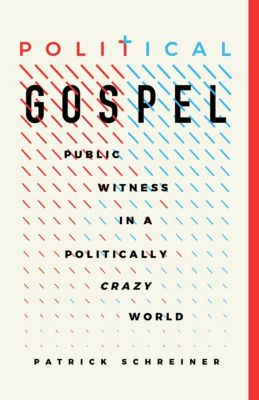
Church leaders need to equip their people to navigate the politics of an election year. And some guiding principles can serve pastors well.
By Daniel Darling
The calendar has turned over, and we are now in the thick of a political season in a presidential election year. Pastors around the country understand the gravity of this moment and want to lead their people well. So, what does that look like?
Every church and every context is going to be a little different. So, church leaders will need to equip their people in different ways. Still, there are some guiding principles that can serve pastors well.
1. Lead with gratitude for the opportunity to shape our communities and our country
In the maelstrom of an election season, with its flood of robocalls, mail pieces, TV ads, and social media battles, it’s difficult to find joy. But even as we grow exhausted and weary of the mudslinging, we might consider how fortunate we are to live in a country where we have at least some say in who leads us and what policies are enacted. This is a privilege afforded to few humans in the history of the world.
Today, even as democracy is more widespread, there are billions of people who live under tyranny. They’d love the opportunity to be able to speak out and vote. Pastors should encourage their people toward gratitude to God for allowing us to live in freedom. Gratitude is in short supply these days, as we have so many reasons to complain and so many platforms that allow us to register those complaints.
“Pastors should encourage their people toward gratitude to God for allowing us to live in freedom.” — @dandarling Click To Tweet2. See this moment as an opportunity, not an obstacle
Paul urges his pastoral protégé, Timothy, to be ready to preach and teach whether “in season or out of season” (2 Timothy 4:2, CSB). In other words, we must be ready to equip our people for the moment we are in, not the moment we wish we were in.
This election cycle affords pastors the opportunity to help equip their people to live on mission in the world around them. If the church doesn’t step up, other voices will catechize God’s people throughout the week—some good, some bad. Our silence communicates that politics is one area over which Christ is not king and of which His Word does not speak.
3. Remind Christians that citizenship is something to be stewarded wisely
It is no accident that God has placed American Christians in the U.S. in 2024, with all the political and social strife that has come with it. This is our mission field. This is where we are to seek the welfare of our city (Jeremiah 29:7).
In many other countries, the average citizen has little agency or power; there is little stewardship. But in a nation like ours, we share power and therefore are tasked with stewarding our citizenship in a way that honors Christ. So, how believers navigate an election season is a matter of Christian discipleship.
4. Seek to be political but not partisan
The gospel itself is inherently political. When the first century Christians gathered weekly and declared that Christ, not Caesar, was Lord, they were making a political statement. When they refused to participate in the ritual ceremonial practices that required worship of false gods, they were in direct conflict with the culture, with the politics of the moment.
Today, believing Christ and obeying Scripture will inevitably put us in conflict, at some point, with those around us. We can’t avoid being political. And yet, pastors should avoid being partisan. Churches should be intentional about discussing what the Bible has to say about important issues without overtly endorsing politicians or engaging in partisan mudslinging.
“Churches should be intentional about discussing what the Bible has to say about important issues without overtly endorsing politicians or engaging in partisan mudslinging.” — @DanDarling Click To Tweet5. Distinguish between issues of consequence and issues where there are legitimate differences among believers
There are issues to which God clearly speaks through His Word. And there are issues where the Bible offers broad ideas that have a variety of applications and where good, faithful Christians might disagree.
One example of a concrete issue: Scripture is clear about the sanctity of human life. We should not flinch from saying humans have dignity and deserve protection from conception to natural death. Pastors should be courageous to declare this.
One example of a not-so-concrete issue: While Scripture is clear on the necessity of nations to care for and not exploit the poor, Scripture is not clear on the exact approaches by governments for alleviating poverty or the appropriate level of taxation. So, pastors should not make it seem as though Scripture explicitly favors one approach over another. And good Christians can disagree.
6. Remind God’s people who they are
Even as it is a matter of Christian stewardship to engage the political process, it is also a matter of Christian discipleship to walk worthy of the gospel as we are doing it (Ephesians 4:1). Christians should not only be distinctive from the world by the truth we proclaim but by the way we proclaim it. Politics does not give us an excuse to abandon our Christian calling.
1 Peter 3:15-16 urges us to both: “give a defense to anyone who asks you for a reason for the hope that is in you” and to do this with “gentleness and reverence” (CSB). We are not exempt from obedience from the Scriptural commands toward good speech and good conduct merely because we are in an election year. Even as we venture into the political arena, we do not stop being the people of God.
7. Honor those who are in public office, even when we disagree
In his first letter, the apostle Peter urges the church to fear God and honor the king (1 Peter 2:17). This is the same king who would eventually send Peter to his death for the crime of preaching the gospel. Peter, given an opportunity, would certainly not have voted for Nero, but here he is urging Christians to give honor to the one whom God has allowed in power.
We can and should oppose wicked rulers. We should exercise our right to vote for the best possible leaders. Yet, we are compelled to honor those in authority, even those with whom we disagree. The ability to do this will mark us as different from the world. This is especially important in an election season.
8. Ground your people in the hope of Christ
Before he went to the cross, Jesus told His disciples: “Be courageous! I have conquered the world” (John 16:33b, CSB). Christians are right to be concerned about destructive policies in the culture and failed leadership from our elected officials. It’s not wrong to act on those genuine concerns. But we can find joy and hope, no matter what happens in an election season because we know Christ ultimately has triumphed over sin, death, and the grave.
We know He’s coming again to fully renew and restore the world. So, we engage, but not as those with no hope. Pastors, your people aren’t going to get gospel hope anywhere else they look. They won’t hear it on cable news or on their political podcasts or from their favorite politician. They must hear this every week in church, as the world swirls in confusion and chaos around them.
9. Remember the importance of spiritual formation in an election season
It is easy for us to get so caught up in the drama of an election season that we forget the care of our own souls. James 1:27 tells us that genuine spirituality involves both care for the vulnerable (widows and orphans) and personal piety (keeping yourself unspotted from the world).
There is an unhealthy way to engage politics that neglects the care for our souls. We can easily get caught up in consuming content, watching the polls, and engaging in the arguments and set aside Scripture reading, prayer, and meditation. Our engagement in the world will only ever be as effective as we are connected to Christ through the power of the Spirit. Pastors must not only urge their people to do the right things but to pursue being the kind of people conforming to the image of Christ.
“Our engagement in the world will only ever be as effective as we are connected to Christ through the power of the Spirit.” — @DanDarling Click To Tweet10. Strive to maintain unity
Politics and elections are important. Bad public policy can have a negative impact on our communities’ flourishing, on real people. Good public policy can help the vulnerable and strengthen our communities. Yet, we shouldn’t let our engagement come at the expense of Christian unity. Paul urges Christians to make “every effort to keep the unity of the Spirit through the bond of peace” (Ephesians 4:3, CSB). This implies an intentional effort.
In this election season, Christians will have differences on policy, on politicians, on approaches to cultural engagement. Our social media platforms reward hot takes and anger. It’s good and right for Christians to make good arguments, to speak out, to vote, to mobilize others, to run for office, to participate in our democracy. Yet we shouldn’t let a temporary political figure or a fleeting political moment destroy our friendships and keep us from loving our brothers and sisters in Christ. What we share as blood-bought, redeemed sinners is much more valuable than where we differ in a heated political season.
11. Model this behavior in your own actions, online and in conversations
Paul told Timothy that, as a pastor, he should “set an example for the believers in speech, in conduct, in love, in faith, and in purity” (1 Timothy 4:12b-13, CSB). The most important way you will teach your people this election season is by modeling for them how to engage.
This doesn’t mean you should be shy about issues that matter, but it does mean you should be wise about the way you speak up and the words you use. Whether you realize it or not, those you lead are watching you. You are modeling for them a way of speaking, acting, and engaging.
Do your words, both in the pulpit, on social media, and in other places show them a pastoral model for how to live faithfully for Christ?
For permission to republish this article, contact Marissa Postell Sullivan.

Dan Darling
Dan is the director of the Land Center for Cultural Engagement at Southwestern Seminary. He is the bestselling author of several books, including Agents of Grace.












